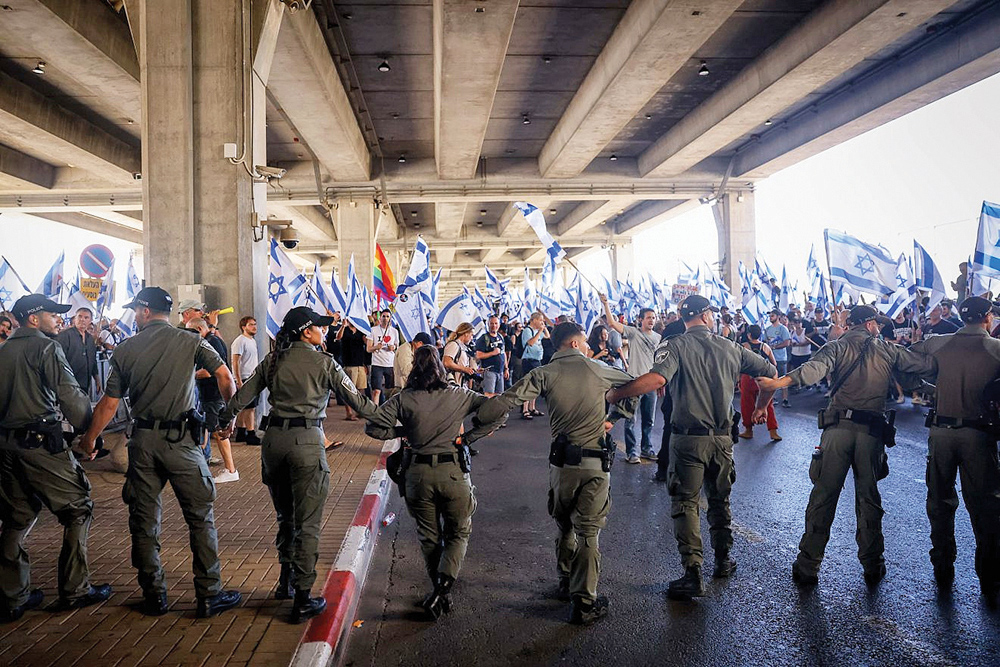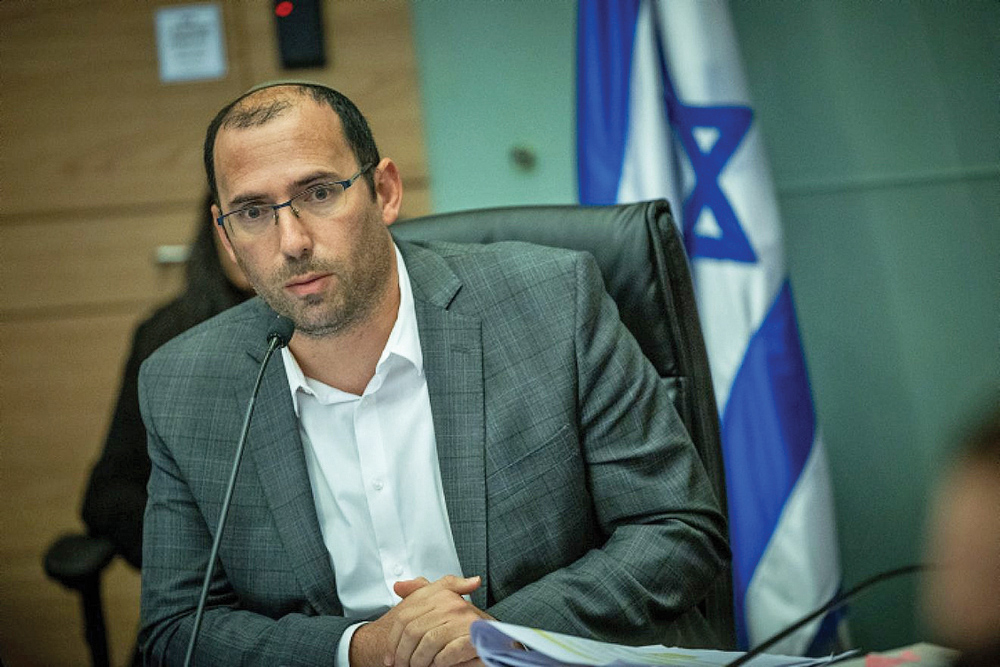Demonstrators block roads, attempt to shut down airport, clash with police, as reform legislation advances.
Police arrested 71 persons on Tuesday, July 11, who participated in protests and violated public order as thousands of opponents of the government’s judicial reform initiative blocked highways and interchanges across the country after the Knesset voted overnight to advance key legislation.

“Day of Resistance.” (Credit: LIRON ALMOG/FLASH90)
Thirty-three of the suspects were arrested during disturbances in the Tel Aviv District, 21 in the Central District, 10 in the Jerusalem District and seven in the Coastal District, police said.
Forty-five of the 71 suspects have been released, police added.
More arrests are expected.
While police would not provide estimates to JNS on the number of protesters, there appeared to be significantly fewer participants than in previous demonstrations held over the past few months.
In Tel Aviv, protesters clashed with police. Police were making much more of an effort to keep the city’s main routes open than during past protests against the judicial reforms, deploying water cannons against people illegally blocking the roads.
The protests continued at the entrance to the Ben-Gurion Airport train station Tuesday afternoon, where protestors expressed their discontent with Prime Minister Benjamin Netanyahu’s judicial reforms, blowing horns, drumming, and chanting “Demokratia.”

(Photo by Chaim Goldberg/Flash90)
Many protesters carried Israeli flags, turning the station into a sea of blue and white.
Police and protesters engaged in a standoff on either side of the barricades as police tried to establish a square where airport travelers could walk freely. Once police decided to clear an area, every protester in that space – including women, children and elderly people – were pushed back. Sometimes, this led to violent clashes where protesters were pushed down to the ground.
Israel Police Commissioner Kobi Shabtai spoke on TV Tuesday night, praising the police handling of the day of demonstrations.
“We succeeded in safeguarding the right to protest and balancing between the freedom to protest and freedom of movement as much as possible,” he said.
On KAN 11, he also dismissed concerns that keeping protesters in a cordoned-off area at the airport caused overcrowding and put the protesters in danger.
“This is a misrepresentation. Whoever is complaining about overcrowding can go to the right or left,” he said.
More Than Just Legislation
Several protesters said that the protests were about far more than the reasonability clause legislation.
Yoav, 16, who came to protest with his father, held a sign that read “saving Israeli democracy.” He said that young Israelis like him do not see a future in Israel anymore.
“The current government just doesn’t understand that Israel will always be a liberal country, and if they want to let go of those values, we won’t let that happen,” Yoav said.
An older protester, who asked to be anonymous, said that the country was turning into a “mafia.”
“The people who have been selected to lead the country run it like a mafia, they commit actions that are contrary to everything that is in the Declaration of Independence,” he said. An Israeli by birth, he said that he has never seen such a clear erosion of democracy in Israel.
Another protester, Tami Reich, 66, from Rishon Lezion, shared sentiments of pessimism. “This is very, very difficult. I don’t see a way forward. The future does not look good, I’m not very optimistic, because I feel like the difference between the sides is too big to come together,” she said, alluding to the belief of many protesters that a civil war is looming.
“This time everything is more emotional,” she said. “You can see it with the protesters; you can see it with the police. There’s a lot of violence and more emotion out there.”
Yuval Lerner, standing just outside the entrance, declared that if “we don’t win, I am flying away.” He said that everything this government has done pushed him to come out to protest.

Inside the airport, the environment was quiet – once travelers passed the entrance, they experienced no disruption to their flight. But police held a stalwart border leading into the building, asking passersby where they were going and sometimes for identification.
One traveler, who asked to be anonymous, said that though the protests were “annoying,” she understands the cause. She said she came much earlier to her flight than normal to avoid delays.
Protest leader Josh Drill called the turnout “great,” and attendee Yigal Zror concurred, remarking that more people were present on Tuesday than at the previous week’s protest.
The Israel Airports Authority issued a statement saying that the demonstrations had only minor effects with operations there, with all scheduled flights departing except for one due to a technical problem.
The authority said that some 90,000 travelers passed through the airport and the few delays that took place were due more to the heavy number of passengers than to the protests.

The “Day of Resistance” also saw marches, demonstrations and convoys to highways in and around Jerusalem, Tel Aviv, Haifa and the Binyamin region.
Police made additional arrests in the afternoon, including in Tel Aviv for an illegal demonstration on Kaplan Street, where officers kept activists from reaching the nearby Ayalon Highway, and two in Jerusalem.
In Haifa, police declared a protest illegal after thousands of demonstrators blocked an access road to the Carmel Tunnel.
The Knesset Constitution, Law and Justice Committee convened on Tuesday to prepare for the second and third plenum votes on a bill to restrict the use of the “reasonableness” standard by the Supreme Court. This comes after the parliament overnight Monday passed the bill on first reading.
Monday’s vote was taken along partisan lines, 64-56.
MK Simcha Rothman, chairman of the Knesset Constitution, Law and Justice Committee, said Sunday he would immediately prepare the bill for the two additional plenum votes necessary for it to become law.
The goal of the coalition is to pass the bill before the end of the summer session on July 29.
The legislation would bar “reasonableness” as a legal justification for judges to reverse decisions made by the Cabinet, ministers and “other elected officials as set by law.”
Critics say the standard is legally vague and has been used by the Supreme Court to encroach upon the government’s authority. Opponents say the bill will erode Israel’s system of checks and balances and lead to an abuse of power.
The initiative “isn’t the end of democracy, but rather will strengthen democracy,” Netanyahu said on Monday in defense of the legislation.

(Photo by Yonatan Sindel/Flash90)
“The rights of the courts and Israeli citizens will not be harmed in any way. The court will continue to monitor the legality of government decisions and appointments. [We] will be required to act in good faith and with proportionality, fairness and equality,” he added.
Opposition leader Yair Lapid on Tuesday predicted that passing the “reasonableness clause” into law would bring down the coalition.
“This law is the end of this government. It will bring about your downfall. Governments that act in such a callous way against Israel’s interests will not survive,” the Yesh Atid chairman said at the Constitution Committee meeting.










